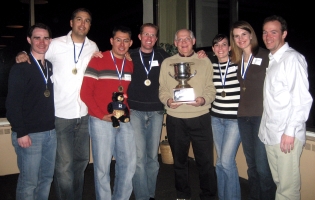BYU MBA Team Places First in Race and Case Competition

L to R: Dan Iverson; Cale Wester; Juan Quilantan; Kyle Poll; Dr. Bruce Hutton, Interim Dean of Daniels College of Business; Heather Tucker; Michelle Quinn; and Russ Tanner
PROVO, Utah — Mar 07, 2008 — Racing down a professional ski course was just part of the University of Denver’s 2008 Race and Case competition, where six Marriott School MBA students earned first place in the combined skiing and ethics case event.
“These students have been wonderful representatives of the Marriott School’s commitment to ethical decision-making in business,” says Craig Merrill, MBA program director. “We are very happy for their accomplishment, and we’re glad they can also make it down a mountain.”
This year’s Marriott School team was composed of Dan Iverson, from Layton, Utah; Kyle Poll, from Layton, Utah; Juan Quilantan, from Veracruz, Mexico; Michelle Quinn, from New Canaan, Conn.; Heather Tucker, from Clarkston, Wash.; and Cale Wester, from Eagle, Idaho. Since the competition was established in 2004, Marriott School teams have taken first place twice.
The ski challenge was evaluated by the combined time of the two fastest women and two fastest men on each team. The BYU students took fourth place in the ski race, which counted for one-third of the total score. The remaining points were awarded for the case portion of the competition, where the BYU team placed first – beating teams from the University of California at Berkley, University of Notre Dame and others.
For this year’s case, the teams theoretically represented Solidarity Fund, a development capital fund that invested in Gildan Active Wear, a T-shirt manufacturing company located in Montreal. After more than five years of collaboration with Gildan, a television program revealed that workers in the company’s Honduras plant were being exploited and fired for showing interest in forming unions. When the company denied the accusations and refused to implement new standards, Solidarity Fund had to choose whether to stay in the company or sell its 11 percent ownership.
“The ethical dilemma was choosing the best option not only for the fund’s financial future but also for its relationship with the community,” Poll says. “We did not simply want to sell our ownership of the company to demonstrate our standards for this situation. We felt the business community needed to know we left Gildan because of its unethical behavior.”
Even with the team’s chosen strategy to sell Solidarity’s ownership of Gildan, the final presentation to the judges became a pivotal factor in winning the case. As part of the presentation, the team included short audio clips in which each of the stakeholders explained their experiences with Gildan. These included Rosa, a Honduran line worker; Jean, a union worker in Montreal; and Stanley, a Solidarity Fund shareholder.
“We wanted our judges to know the self-interests of each of our stakeholders and introduce the reality of their situation,” Tucker says. “I think doing this not only allowed our knowledge on the subject to come through but also our passion to do what was best for everyone involved. Analyzing how each stakeholder will be affected is an important element of ethical decision-making. ”
The Marriott School is located at Brigham Young University, the largest privately owned, church-sponsored university in the United States. The school has nationally recognized programs in accounting, business management, public management, information systems and entrepreneurship. The school’s mission is to prepare men and women of faith, character and professional ability for positions of leadership throughout the world. Approximately 3,000 students are enrolled in the Marriott School’s graduate and undergraduate programs.
Media Contact: Joseph Ogden (801) 422-8938 or 787-9989
Writer: Irasema Romero (801) 422-5629



